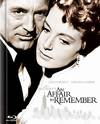





The Lassie Movies
Filmography | Articles | Awards | Downloads | Image Credits
| Article 1 |
Profile of a CollieOr the Cinderella-Like Story of How 'Lassie' Won Stardom in the MoviesNew York Times, February 28, 1943, page X4 |
|
Hollywood. -- Eric Knight's "Lassie Come Home" provides at least a partial solution to the present dearth of Hollywood leading men. it has none. The casting problem therefore was negligible, calling for a character actor, a boy and a dog. Those selected to fill the bill were Donald Crisp, Roddy McDowell [sic] and Lassie, a 3-year-old collie newcomer, and one of the few feminine movie stars born with her own fur coat. If Lassie had her curves in the right places and fluttering lashes to go with her big brown eyes, she would have been an apt subject for concentrated film press agentry. She has a good story, being a Cinderella of the canine world. In common with Clark Gable, whose career in its early phases was hindered and embarrassed by big ears, Lassie got nowhere during her early years, having been the runt of her litter, with a head too broad, eyes too large, and hair too dark for acceptance on the best collie circles. Lassie is the discovery of Rudd Weatherwax, who worked for cinema dog trainer Rennie Renfro before setting out on his own. Lassie was his first purchase. Her bright intelligence sold him, despite the blemishers that made her a show bench outcast. Also her price tag, which was ten dollars. Picture trends ran against her from the first, with lap pooches and cute mongrels mostly in demand, and collies not at all. In time, Weatherwax gathered together a kennel of forty assorted types. Needing space for his breadwinners, Lassie was affectionately sent to live a careless life on the Weatherwax ranch. When MGM purchased Knight's tender story about a Scottish [sic] boy and his collie dog, Lassie was hastily groomed for a crack at the role. She was a sorry sight. Roaming through the brush had ruined the natural beauty of her ruff. It was torn, tattered, and packed with burrs and stickers. Paraded before Director Fred Wilcox with more regal members of her clan, she was passed by with a disdainful flick of the hand. No one even bothered to ask about her I.Q. Director Wilcox hurried off to San Francisco to interview the blue ribbon winner of a show in that city. The dog was handsome but dumb. So he headed for New York and Boston to look over other candidates staked out by his talent scouts. There were plenty of photogenic collies to be had, but none with the near human attributes Knight had lavished on his heroine. Wilcox returned disgustedly in two months, his search a flop. New Coat for Lassie During the director's absence Weatherwax lavished attention on Lassie. Her ruff was brushed until it sparkled. She was taught every trick required by the part, and proved a remarkable student. A tomcat could walk up, bat her on the snout, and Lassie wouldn't move a muscle. She worked to silent signals. She could escape from a leash, would attack a man upon command, stagger as though near exhaustion, and pose proudly by the hour without tiring. Weathewax anxiously telephoned Wilcox on the day of his return. He had another collie to show. Wilcox retorted that if it was the same collie, he knew what he could do with the beast. Weathewax told Wilcox he was making a mistake if he didn't see the new animal. Wilcox did, and the rest has a familiar ring. Technicolor-tested, the points that made Lassie undesirable for show elevated her to the rank of movie queen. Her oversized head, big eyes and dark coat photographed with superior results. Lassie emerged from a finale conference with a fat contract for $250 a week, insurance against bombs and accidents while traveling, and two Victory Bonds purchased from her first earnings. She was transported in style to the State of Washington to work along the rugged California coast line at Monterey, and in the San Joaquin Valley, where backgrounds were found to simulate those of Scotland. Lassie's life is now one of congenial labor, ease, plenty and comradeship with young McDowell [sic]. She seems to relish it. There is only one blemish on her personal life so far revealed. Her real name is, prosaically, Pal. She is a him. © 1943 New York Times |
|
Article 1 |
Article 2 | Article 3 |
| Now in Print! |
|---|
| Now on DVD! |
|---|
Buy Videos & DVDs |
|
Buy Movie Posters |
|
Buy Movie Posters |
|
Classic
Movie Merchandise |
|
![]() Printer-friendly version.
Printer-friendly version.
![]() Return
to the top.
Return
to the top.
Last updated:
March 10, 2011.
Reel Classics is a registered trademark of Reel Classics, L.L.C.
© 1997-2011 Reel Classics, L.L.C. All rights reserved. No
copyright is claimed on non-original or licensed material.
Terms of Use. Privacy Policy.









